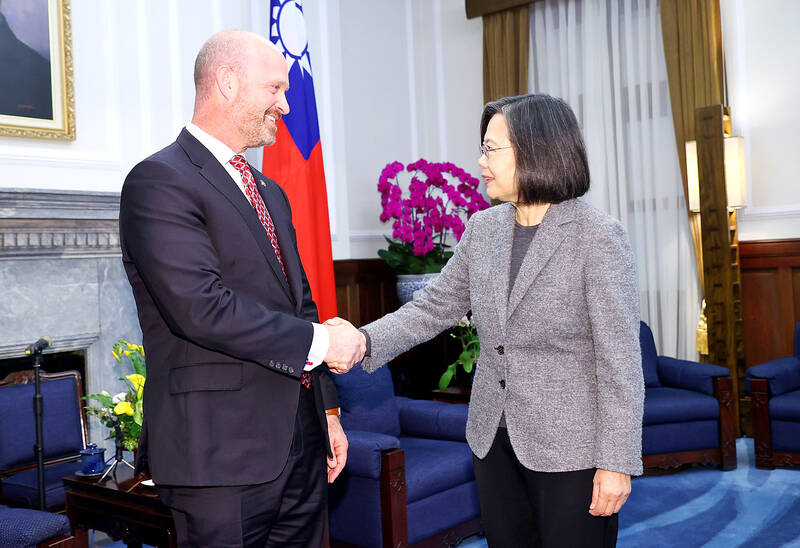Taiwan ranks fourth in the latest Index of Economic Freedom released by the US Heritage Foundation, which foundation president Kevin Roberts delivered personally to President Tsai Ing-wen (蔡英文) and Vice President William Lai (賴清德) yesterday while reaffirming Washington’s support for the nation’s security.
This year’s index graded 184 nations based on their economic policies and conditions from July 1, 2022, through June 30 last year, the foundation said.
Economic freedom is assessed based on 12 factors in four broad pillars — rule of law, government size, regulatory efficiency and open markets — each on a scale of 0 to 100.

Photo: CNA
The overall world economy was “mostly unfree,” with the global average score for economic freedom falling to 58.6 from the previous report’s 59.3, the lowest it has been since 2001.
With a score of 80, Taiwan was among only four nations scoring above 80 to be marked as “free” in the index along with Singapore, Switzerland and Ireland.
Taiwan maintained its ranking of fourth in the world and second among 39 Asia-Pacific economies from the previous report, but its score decreased by 0.7 points.
Taiwan is an “exemplary free-market democracy” and has a “strong commitment to the rule of law and openness to global commerce,” the report said.
Small and medium-sized enterprises are the backbone of Taiwan’s economic growth and resilience, it said, adding that “monetary stability has been well maintained despite inflationary pressure.”
Relatively low scores were given to “labor freedom” and “financial freedom,” but the report did not provide negative comments regarding those indicators.
Roberts congratulated Taiwan on the ranking, praising the nation as “one of the shining lights of the world” when he led a delegation to meet with Tsai at the Presidential Office in Taipei yesterday.
He also thanked Tsai for “maintaining the status quo of peace” with courage, and vowed to preserve that peace after she leaves office in May to honor her service.
Tsai is beloved by Taiwanese and the foundation, and would “remain beloved by free people across the world,” he said.
Tsai thanked the foundation for its long-term support for Taiwan-US relations, and its efforts to promote economic, trade and security cooperation between the two sides.
Expanding cooperation with the US, an important security and trade partner of Taiwan, not only serves the interests of both sides, but would also help ensure the security and stability of the global supply chain, she said.
Earlier yesterday, Roberts’ delegation met with Lai to offer its congratulations on him winning the presidential election last month.
Taiwan has friends in the foundation and across the US who understand and support the nation’s freedom and security, Roberts said, adding :“You can count on us.”
Lai solicited the foundation’s continued support for the nation as it is still facing many challenges, including direct threats from China, climate change, global digitization and global supply chain restructuring.
He pledged to continue firmly defending the cross-strait “status quo” and to contribute to peace in the international community.

AGING: As of last month, people aged 65 or older accounted for 20.06 percent of the total population and the number of couples who got married fell by 18,685 from 2024 Taiwan has surpassed South Korea as the country least willing to have children, with an annual crude birthrate of 4.62 per 1,000 people, Ministry of the Interior data showed yesterday. The nation was previously ranked the second-lowest country in terms of total fertility rate, or the average number of children a woman has in her lifetime. However, South Korea’s fertility rate began to recover from 2023, with total fertility rate rising from 0.72 and estimated to reach 0.82 to 0.85 by last year, and the crude birthrate projected at 6.7 per 1,000 people. Japan’s crude birthrate was projected to fall below six,

Conflict with Taiwan could leave China with “massive economic disruption, catastrophic military losses, significant social unrest, and devastating sanctions,” a US think tank said in a report released on Monday. The German Marshall Fund released a report titled If China Attacks Taiwan: The Consequences for China of “Minor Conflict” and “Major War” Scenarios. The report details the “massive” economic, military, social and international costs to China in the event of a minor conflict or major war with Taiwan, estimating that the Chinese People’s Liberation Army (PLA) could sustain losses of more than half of its active-duty ground forces, including 100,000 troops. Understanding Chinese

US President Donald Trump in an interview with the New York Times published on Thursday said that “it’s up to” Chinese President Xi Jinping (習近平) what China does on Taiwan, but that he would be “very unhappy” with a change in the “status quo.” “He [Xi] considers it to be a part of China, and that’s up to him what he’s going to be doing, but I’ve expressed to him that I would be very unhappy if he did that, and I don’t think he’ll do that. I hope he doesn’t do that,” Trump said. Trump made the comments in the context

SELF-DEFENSE: Tokyo has accelerated its spending goal and its defense minister said the nation needs to discuss whether it should develop nuclear-powered submarines China is ramping up objections to what it sees as Japan’s desire to acquire nuclear weapons, despite Tokyo’s longstanding renunciation of such arms, deepening another fissure in the two neighbors’ increasingly tense ties. In what appears to be a concerted effort, China’s foreign and defense ministries issued statements on Thursday condemning alleged remilitarism efforts by Tokyo. The remarks came as two of the country’s top think tanks jointly issued a 29-page report framing actions by “right-wing forces” in Japan as posing a “serious threat” to world peace. While that report did not define “right-wing forces,” the Chinese Ministry of Foreign Affairs was